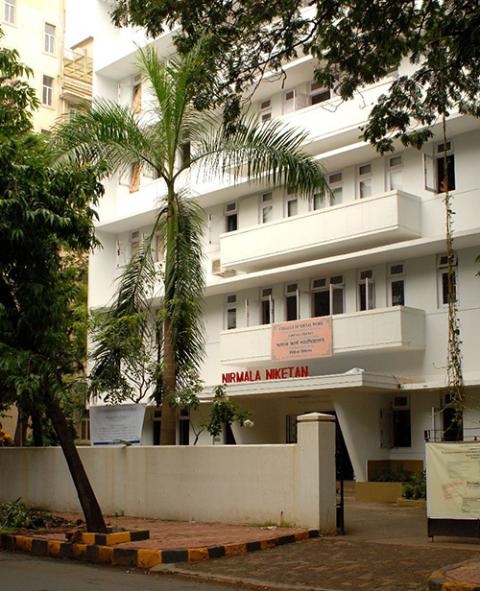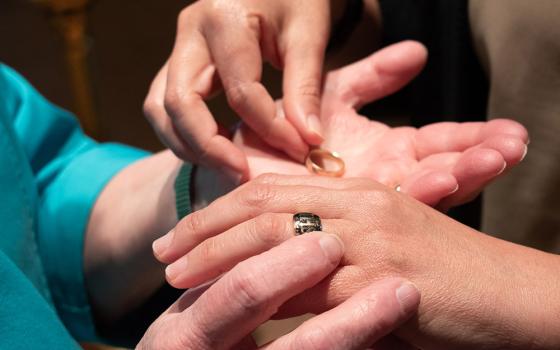
Canossian Sr. Catherine Gonsalves, center, a former pupil of Nirmala Niketan, with beneficiaries at a self-help group meeting in Mahim, a suburb of Mumbai, India (Courtesy of Catherine Gonsalves)
Hundreds of nuns and priests serving the Indian church as social workers say they owe their inspiration and training to a French congregation that came to the country seven decades ago.
The Daughters of the Heart of Mary have "trained a workforce within the church to create a justice-based society," said Sr. Maria Nirmalini, president of the Conference of Religious India, the national body of Catholic religious in the country.
Nirmalini, a member of the Congregation of the Apostolic Carmel, describes social work as a major mission of the church where hundreds of religious work to empower the poor.
Sr. Philomena D'Sa, provincial of the Daughters of the Heart of Mary's southern province, said her congregation's main apostolate in India is to train social workers, especially nuns and priests.
Men and women from various congregations who attended their two colleges of social work now head thousands of projects at the grassroots across India, she said, and many alumni have started nongovernmental organizations and community-development programs.
"We are happy that they stand for justice, peace and equality, the core values of social work," D'Sa told Global Sisters Report.
The Daughters of the Heart of Mary came to India in 1951 and now train around 100 Catholic religious and others every year in social work at the College of Social Work at Nirmala Niketan (House of the Immaculate) in Mumbai and the School of Social Work at Roshni Nilaya (House of Light) in Mangaluru, Karnataka.
Nirmalini said alumni of these two institutes "are the backbone of the church's works on the periphery. These institutes have changed the mindset of their students, especially the nuns, on their vocation as well as social work," she told GSR.

Nirmala Niketan, which was founded in 1955 under the congregation's northern province, was the first church-based college of social work in India. Today, it produces around 40 trained social workers, mostly nuns, annually.
Sr. Lidwin Dias, its principal, told GSR that the institute only offers bachelor's and master's degrees in social work, with 60 students in each batch.
"More than 30% of our students are priests and nuns, which means we indirectly contribute to the vision of the church's social apostolate," she said.
Dias also pointed out that the college manages nearly 50 social work projects that give practical training to its students through community development programs, medical and psychiatric social work, and work in correctional facilities.
Roshni Nilaya under the southern province was founded in 1960 by Sr. Olinda Pereira, who is considered the mother of social work in southern India. Until her death in 2020, she motivated hundreds of young people, nuns and priests to work for a justice-based community.

Sr. Shanthi Vincent of Congregatio Jesu (at right, standing) attends a village meeting in the eastern Indian state of Bihar. Vincent said her idea of social work changed from "charity to empowerment" after her master's program at Nirmala Niketan. (Courtesy of Shanthi Vincent)
The institute currently teaches around 600 students for bachelor's and master's courses and also offers master's degrees in counseling and psychology.
Students are assigned guides for field work who assist them in integrating theory and practice. Students receive clinical practice under supervision at the campus' kindergarten, family service agency, family counseling center, and helpline for children in crisis. The college conducts specialized courses in community development, medical and psychiatric social work, human resource development, and criminology.
Sr. Evelyn Bennis, who heads the community development department, said Roshni Nilaya engages in several social work projects as an extension of the training. One of them, a waste-management project started in 2016, unites people of all religions and cultural backgrounds, she said.
Advertisement
"We initially trained 10,000 school students about the importance of waste management, and through them, we reach out to their homes," Bennis told GSR.
Sr. Juliet Joseph Chirakkaparambil, a former Roshni Nilaya principal, recalls facing several hurdles and challenges in the school's initial years.
"Social work was not recognized as a professional course when we started, so we had few takers in the initial years," she told GSR.
In the third year, they had only three students, and two dropped out. The nuns decided to close the institute and asked the lone student to quit the course.

Daughter of the Heart of Mary Sr. Juliet Joseph Chirakkaparambil, center, with two lay teachers at Roshni Nilaya in the southwestern Indian city of Mangaluru (Thomas Scaria)
"But she was adamant to continue. We are here today because of her," Chirakkaparambil said.
She said the limited number of students and absence of other professional courses has always been a challenge for the institute, but they go forward anyway because of the mission of training social workers.
Nuns who have graduated from the two institutes say their education in social work has given them more meaning and purpose in their religious life.
Queen of Apostles Sr. Leena Valookaran, who graduated from Roshni Nilaya 12 years ago, now works among village children in Honnavar, a coastal region in Karnataka.

The Roshni Nilaya campus, managed by the Society of the Daughters of the Heart of Mary in the southwestern Indian city of Mangaluru (Thomas Scaria)
"My vocation was driven by my passion to serve the poor, but my social work education has given me knowledge and skills how to do it," Valookaran told GSR. For her, social work is not charity, but a prophetic mission to liberate people from oppressive structures.
Similarly, Sr. Shanthi Vincent of Congregatio Jesu said her idea of social work changed from "charity to empowerment" after her master's program at Nirmala Niketan. She now works among the Dalit (formerly known as "untouchable") communities in the eastern Indian states of Bihar and Jharkhand.
"If we give the poor a fish, they will have a tasty dinner; but if we teach them to fish, they will continue to have fish curry meals every day," Vincent told GSR.

Apostolic Carmel Sr. Marykutty Joseph, far right, at a protest demanding justice for victims of the pesticide endosulfan in the southwestern Indian state of Kerala (Courtesy of Marykutty Joseph)
Apostolic Carmel Sr. Marykutty Joseph, who works among a tribal community in Nilambur in the southwestern Indian state of Kerala, said she absorbed many values during her studies at Roshni Nilaya.
In 2015, Joseph received the Best Social Worker Award from the Kerala Catholic Bishops' Council for organizing people through self-help groups to implement government developmental programs.
Sr. Catherine Gonsalves of the Canossian Daughters of Charity, Servants of the Poor said she finds "true meaning" in her vocation when she is with people at the grassroots. The 52-year-old nun, who graduated from Nirmala Niketan in 2019, organized 11 self-help groups during the COVID-19 pandemic that helped migrant laborers and mobilized government welfare programs.
Some students of Roshni Nilaya have even joined the Daughters of the Heart of Mary, Chirakkaparambil said.
One of them, Sr. Colin D'Souza, told GSR that she was attracted by the simple lifestyle of the nuns, who dress like common people and mingle easily with students and others.
D'Souza said several former students have contributed tremendously to empower the poor in various parts of India.
Nirmalini, the leader of more than 130,000 Catholic religious in India who grew up near Mumbai's Nirmala Niketan, said she was influenced by the Daughters of the Heart of Mary's passion for social work.
"They were among people listening to their cry and helping whenever they could," she said.









